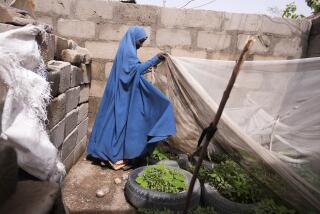The Silent Emergency
- Share via
The State of the World’s Children remains precarious, dramatized by the 280,000 who die each week. The annual report of the United Nations Children’s Fund (UNICEF) reminds us once again of those stark facts. Behind the facts is depressing evidence that the organization’s supporters, including the United States, are not providing enough money for this urgent work.
Much has been accomplished since the world organization launched its campaign to focus global attention on ways to reduce the death toll of children in the developing nations. But much remains to be done if UNICEF is to realize its goal of saving more than 11 million lives between now and the end of the century.
In 1985, for example, there were an estimated 3,450,000 deaths that would have been preventable had the children received appropriate vaccinations. UNICEF estimates that 803,000 lives were saved by the expanding vaccination program in that same year. Those saved are among 4 million rescued from almost certain death by the UNICEF campaign to assure such basic elements of public health as universal vaccination and the availability of oral rehydration therapy in cases of diarrhea.
UNICEF has a goal that all can embrace: to bring the same generosity of response that has been mobilized for emergencies, such as the famine in Africa, to address “the silent emergency” of disease and malnutrition that takes the lives of more than 14 million Third World children every year. It is a toll that is unequaled in the history of famines, floods, droughts and earthquakes.
The most affected nations cannot do it without help. For many nations the situation is not improving. The report notes that “1986 has been the seventh consecutive year of negative or negligible growth in incomes” for most Third World nations.
Support from the United States has been eroded by the limits proposed by the Reagan Administration and by congressional ambivalence between generosity and ideological purity. This year, for example, the President asked for $34.2 million for UNICEF, and Congress voted $52 million. But the actual amount will be trimmed by tens of thousands of dollars to meet Gramm-Rudman tax limits and to conform to a political test imposed by members of Congress. Congress wants to be sure that no American funds help starving or ailing children in Libya, Cuba or Syria, or those being helped by the Palestine Liberation Organization or the South-West Africa People’s Organization. The United States, alone among all the donors, imposes a political test on the children whom it is willing to help through UNICEF--an extraordinary departure from the good sense and generosity that traditionally have characterized American support.
As a result of this sort of penny-pinching, UNICEF’s growth in recent years has been held to barely 4%--hardly enough to stand still against global inflation, let alone to assure that the goals of better health for the world’s children are realized by the year 2000. That is something worth talking about with one’s congressional representatives. For, in fact, it is a matter of life and death.
More to Read
Sign up for Essential California
The most important California stories and recommendations in your inbox every morning.
You may occasionally receive promotional content from the Los Angeles Times.









